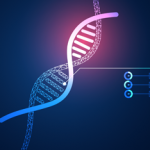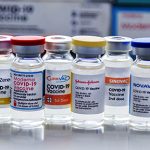Celebrating International Women’s Day, graduate prizes and new investment in research, taking a look at how diet impacts health & genetics can be used to predict disease risk, and pondering the hurdles – and hope – for a return to pre-COVID ‘normal’. Here’s some highlights from this week at Alfred Research Alliance.
MONASH UNIVERSITY
Record investment in epilepsy research made from MRFF
 Fewer seizures, fewer deaths and better quality of life for people living with epilepsy – that’s the aim of the new Australian Epilepsy Project (AEP), with $30 million in funding from the MRFF announced recently by Federal Minister for Health & Aged Care, Hon Greg Hunt MP (pictured). Prof Patrick Kwan (CCS Department of Neuroscience) and A/Prof Zanfina Ademi (SPHPM) are stream leaders in the AEP consortium. Read more…
Fewer seizures, fewer deaths and better quality of life for people living with epilepsy – that’s the aim of the new Australian Epilepsy Project (AEP), with $30 million in funding from the MRFF announced recently by Federal Minister for Health & Aged Care, Hon Greg Hunt MP (pictured). Prof Patrick Kwan (CCS Department of Neuroscience) and A/Prof Zanfina Ademi (SPHPM) are stream leaders in the AEP consortium. Read more…
MONASH CENTRAL CLINICAL SCHOOL
The ketogenic diet for super refractory status epilepticus (SRSE) – why and how?
 The mortality rate for SRSE is up to 40% and controlled clinical trials of any treatment are severely limited. Now, dietician Neha Kaul (left) is working with PhD student Dr Joshua Laing from the CCS Department of Neuroscience say the ketogenic diet is emerging as a potential treatment option. Read more or listen to their podcast…
The mortality rate for SRSE is up to 40% and controlled clinical trials of any treatment are severely limited. Now, dietician Neha Kaul (left) is working with PhD student Dr Joshua Laing from the CCS Department of Neuroscience say the ketogenic diet is emerging as a potential treatment option. Read more or listen to their podcast…
Alfred medical students & graduates prizes announced
 Congratulations to the Monash medical student and graduate prize winners, announced 3 March 2021, including Laura McArthur (Harriet Power Prize in Medicine), Nicholas Savage (Robert Power Prize in Surgery and Harry Nindlip Green Prize in Medicine), Maria Selvadurai (Hatem Salem Prize), Daniel Edelman (Nip Thompson Prize and Alfred Hospital Residents’ & Graduates’ Association Prize). Read more…
Congratulations to the Monash medical student and graduate prize winners, announced 3 March 2021, including Laura McArthur (Harriet Power Prize in Medicine), Nicholas Savage (Robert Power Prize in Surgery and Harry Nindlip Green Prize in Medicine), Maria Selvadurai (Hatem Salem Prize), Daniel Edelman (Nip Thompson Prize and Alfred Hospital Residents’ & Graduates’ Association Prize). Read more…
BAKER HEART AND DIABETES INSTITUTE
Tutoring program to help bridge the gaps from COVID-19
 The offer of complementary tutoring sessions by the Baker Institute’s Gender Equity and Diversity Committee to assist staff with children impacted during COVID-19 lockdowns has been eagerly embraced. The complementary tutoring sessions are being offered over six months to recognise the enormous impact the lockdowns have had on many Melbourne-based parents juggling home schooling & working from home. Read more…
The offer of complementary tutoring sessions by the Baker Institute’s Gender Equity and Diversity Committee to assist staff with children impacted during COVID-19 lockdowns has been eagerly embraced. The complementary tutoring sessions are being offered over six months to recognise the enormous impact the lockdowns have had on many Melbourne-based parents juggling home schooling & working from home. Read more…
Scientists bring polygenic risk scores closer to clinical use
 The quest to use genetic testing to better determine an individual’s risk of various common diseases is a step closer with the establishment of the first universal reporting standards and open access platform for polygenic risk scores published by two international research teams, both including scientists from the Baker Institute. Read more…
The quest to use genetic testing to better determine an individual’s risk of various common diseases is a step closer with the establishment of the first universal reporting standards and open access platform for polygenic risk scores published by two international research teams, both including scientists from the Baker Institute. Read more…
BURNET INSTITUTE
Hurdles remain, but post-COVID future is on the horizon say Burnet experts
 With no COVID-19 in the community & a range of effective vaccine options available, Australia’s in a privileged position, and in this article for Nine Media, Burnet’s Prof Brendan Crabb AC and Prof Mike Toole AM say that, while hurdles still remain, with luck, good planning and bold policy action, a return to pre-COVID ‘normal’ is on the horizon. Read more…
With no COVID-19 in the community & a range of effective vaccine options available, Australia’s in a privileged position, and in this article for Nine Media, Burnet’s Prof Brendan Crabb AC and Prof Mike Toole AM say that, while hurdles still remain, with luck, good planning and bold policy action, a return to pre-COVID ‘normal’ is on the horizon. Read more…
Burnet Institute celebrates International Women’s Day 2021
 Burnet celebrated #IWD2021 by exploring how COVID-19 is impacting women and girls the world over, and the research being done at Burnet to identify and address imbalance, and celebrating the important work done by the Institute’s Women in STEM, with Burnet Gender Equity, Diversity and Inclusion (GEDI) Council chair, Prof Caroline Homer AO saying the Institute is “committed to gender equity and ensuring that women scientists are enabled, supported and celebrated.”
Burnet celebrated #IWD2021 by exploring how COVID-19 is impacting women and girls the world over, and the research being done at Burnet to identify and address imbalance, and celebrating the important work done by the Institute’s Women in STEM, with Burnet Gender Equity, Diversity and Inclusion (GEDI) Council chair, Prof Caroline Homer AO saying the Institute is “committed to gender equity and ensuring that women scientists are enabled, supported and celebrated.”
